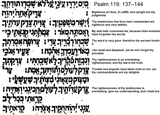Search Results
7/3/2025, 7:23:48 AM
>>17810593
>Acts 13:44-48
>And here it's back to logos.
Aha, so there's no way to misinterpret that passage, then?
The word of God was spoken to them, and they were there to hear the word of God, according to Acts 13. This is the apostles speaking by inspiration of God. There are countless passages like this throughout the Bible. Paul also connects the inspired word of God to Scripture in 2 Timothy 3:16-17. He said, "all scripture is given by inspiration of God," in verse 16. You can compare what Paul said in 2 Timothy also to what it says in Second Peter:
"Knowing this first, that no prophecy of the scripture is of any private interpretation.
For the prophecy came not in old time by the will of man: but holy men of God spake as they were moved by the Holy Ghost."
(2 Peter 1:20-21)
So prophecy, scripture and word of God are all the same. According to the Bible itself, scripture is very specifically that which is written & which is inspired by God (2 Timothy 3:16-17). There is a different word for "scripture" as compared to "writings" generally, which may or may not be inspired. There are of course innumerable places that prove this point, but what has been quoted is enough. It can be shown easily enough that the Bible is in fact God's word, and there are many different ways one can do it. Simply looking at every verse in Psalm 119 (see pic) might be one good way.
>So logos is the "living and enduring" word through which "you have been born again," but rhema is the word of the Lord which "endures forever" (technically, "abides to the age") and "was preached to you."
>I came across describes the distinction between rhema and logos as the distinction between literally what is spoken (and perhaps can be written down) and the concepts that are conveyed by what is spoken, but it seems to be a controversial subject,
Both greek words in the Biblical context at least are used to refer to the same thing: compare 2 Peter 3:5 (τοῦ θεοῦ λόγῳ) and Hebrews 11:3 (ῥήματι θεοῦ).
>Acts 13:44-48
>And here it's back to logos.
Aha, so there's no way to misinterpret that passage, then?
The word of God was spoken to them, and they were there to hear the word of God, according to Acts 13. This is the apostles speaking by inspiration of God. There are countless passages like this throughout the Bible. Paul also connects the inspired word of God to Scripture in 2 Timothy 3:16-17. He said, "all scripture is given by inspiration of God," in verse 16. You can compare what Paul said in 2 Timothy also to what it says in Second Peter:
"Knowing this first, that no prophecy of the scripture is of any private interpretation.
For the prophecy came not in old time by the will of man: but holy men of God spake as they were moved by the Holy Ghost."
(2 Peter 1:20-21)
So prophecy, scripture and word of God are all the same. According to the Bible itself, scripture is very specifically that which is written & which is inspired by God (2 Timothy 3:16-17). There is a different word for "scripture" as compared to "writings" generally, which may or may not be inspired. There are of course innumerable places that prove this point, but what has been quoted is enough. It can be shown easily enough that the Bible is in fact God's word, and there are many different ways one can do it. Simply looking at every verse in Psalm 119 (see pic) might be one good way.
>So logos is the "living and enduring" word through which "you have been born again," but rhema is the word of the Lord which "endures forever" (technically, "abides to the age") and "was preached to you."
>I came across describes the distinction between rhema and logos as the distinction between literally what is spoken (and perhaps can be written down) and the concepts that are conveyed by what is spoken, but it seems to be a controversial subject,
Both greek words in the Biblical context at least are used to refer to the same thing: compare 2 Peter 3:5 (τοῦ θεοῦ λόγῳ) and Hebrews 11:3 (ῥήματι θεοῦ).
Page 1
